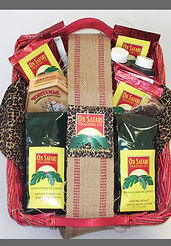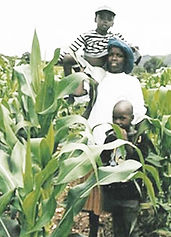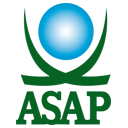










A Self-help Assistance Program was created in 1992 by two Peace Corps volunteers that met and married while teaching in rural Swaziland. They were inspired by the resilience and perseverance of the working poor to lift their families out of poverty. After two years of planning and fundraising, Tom & Liz, with hearts filled with love, a $16,046 grant from the Weyerhaeuser Family Foundation, and a dream,
set off to Zimbabwe for one year in May 1994.
They set up ASAP "A Self-help Assistance Program"
in Zimbabwe and stayed for eleven years.
1994-2001 Zimbabwe Education Programs
ASAP’s programs focused on improving rural education until 2001. In partnership with a private foundation, ASAP paid school fees for thousands of students, implemented infrastructure projects, and worked to improve teaching and learning.
The “Community Building through Education” project provided building materials and construction training to community members and students. Rural communities worked together to prioritize the needs in their cluster of rural schools – and did the work; from digging the foundation to installing roo f sheet. While students gained hands-on experience, ASAP empowered communities to build and furnish over 300 school buildings which mproved education for thousands of children.
ASA P worked to improve math education in 100 rural schools through the “Bridge the Gap” (BTG) project. With funding from The Banyan Tree and Flora Family Foundations, BTG funded math clubs for primary and secondary school teachers, where ideas and activities were shared that improved teaching and learning.
2001-2007 Savings Groups
In 2001, the Zimbabwe economy collapsed. ASAP's program shifted as hunger and poverty gripped the country. With seed-funding from The McKnight Foundation, ASAP helped families survive by providing training on how to form, manage and monitor Savings Groups (SGs) - a self-funding microfinance model that helps families access capital. SGs truly transform lives - especially for women. During hyperinflation in Zimbabwe, ASAP worked in partnership with CARE, Catholic Relief Services, Plan International and Concern Worldwide; helping over 100,000 families survive.
ASAP implemented various skills training projects in conjunction with SGs through the Health and Nutrition Development Initiative (HANDI) project. These cost-effective interventions included:
-
Growing and using medicinal herbs for HIV affected households.
-
Drip irrigation
-
Water harvesting
-
Permaculture techniques
-
Growing Jatropha and Moringa
-
Poultry, Piggery and Rabbit rearing
-
Treadle Pump irrigation
-
Cholera & Malaria prevention
-
Storing and preserving food
-
Vocational Skills training
Funding was provided by New Zealand Agency for International Development, Total Land Care, The Weyerhaeuser Family Foundation, as well as through individual US donors.
2005-2012 Big Changes
ASAP’s head office moved from Zimbabwe to the US state of Georgia in 2005. The Zimbabwe economy continued to collapse and was eventually dollarized in 2008. Funds from asset liquidation in 2005 were used to set up a new program in southern Malawi. Half of the vehicles and computer equipment were transferred from Zimbabwe to establish the new Malawi program. Funding was secured from CORDAID, Sundance Pay It Forward Foundation, and the UN Agency for Financial Inclusion.
In 2009 Tom was diagnosed with Pulmonary Amyloidosis, with a prognosis of less than one year.. During this period of uncertainty ASAP decided it was time for the Zimbabwe and Malawi programs to operate independently. The assets were transferred over to the local CBOs in Malawi in 2011 and Zimbabwe in 2012. Tom passed away in 2017.
2013-present Tools for Empowerment
ASAP was inspired to begin a tool program from seeing first-hand the life-changing impact that receiving trade tools had on struggling entrepreneurs. From 1998-2005 ASAP was the Zimbabwe based in-country partner for a UK based non-profit that has been providing full containers of donated and refurbished trade tools to Africa since 1980.
In 2013 ASAP established the Tools For Empowerment (TFE) project in Peachtree City GA, with seed funding from The International Foundation and The West Foundation. TFE accepts tool donations that are then refurbished by volunteers. In partnership with The Salesian Missions of Don Bosco (SMDB) world-wide, these tools go directly into the hands of vocational school graduates. To date over 1,500 students in Haiti, The Dominican Republic, El Salvador and Peru are better able to generate income with their vocational skills, because they received tools from Tools For Empowerment.
ASAP moved TFE to Newnan GA In 2018 – near the Central Education Center and University of West GA - with funding from the Catholic Commission for Human Development. Currently ASAP is seeking funding to set up a collaborative project with these institutions and local industry to provide trade tools to help local vocational school graduates in GA transition from learning to earning.
1992-2008 Social Enterprise Fund Raising
From inception, ASAP has generated operating support through Social Enterprise. 1) 1992-1994: ASAP’s “On Safari Trading Company’s” mail order exotic food & gifts catalog generated see funding. 2) 1994 -2005: ASAP’s carpentry-with-production training center generated income to cover operating costs, providing school desk-kits, chalkboards and classroom teaching tools to over 250 schools. 3) 2006-2009: “On Safari Coffee Initiative” (OSCI) offered fresh roasted private labeled coffee to help organizations raise money. OSCI generated operating income until the economy tanked in 2008 at which time the assets were sold. 4) Since 2013, "Tools For Growth" generates income by selling tool donations that are not appropriate for TFE recipients. Each June, ASAP's "Flames of Love" generate some income by selling Flame Lilies - the national flower of Zimbabwe.











